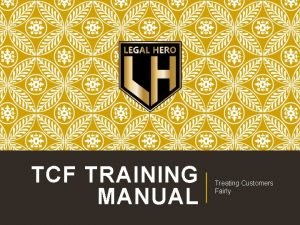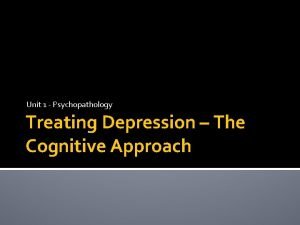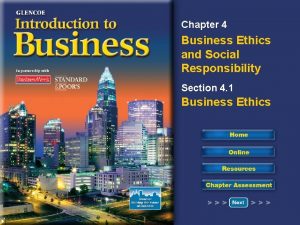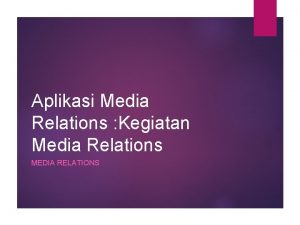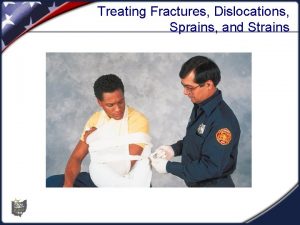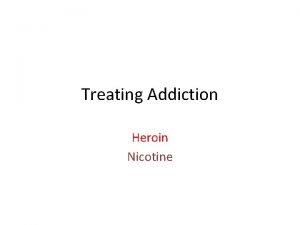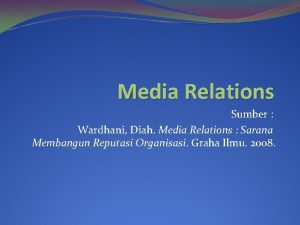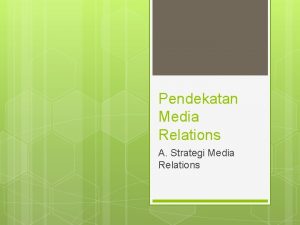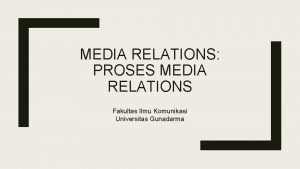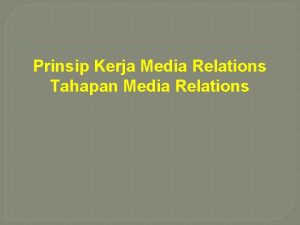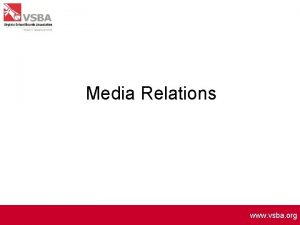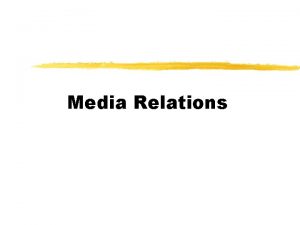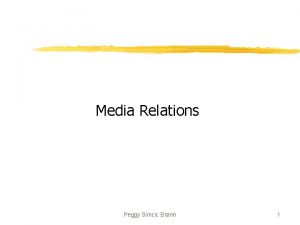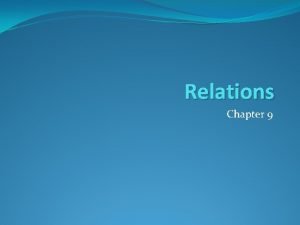Media Relations Media Relations Treating the media reportersjournalists





















- Slides: 21

Media Relations

Media Relations • Treating the media (reporters/journalists) well so they will give you fair, correct, and positive coverage during a problem or a time your in question.

British Petroleum

Who are the key players? • The CEO of BP • The company of BP • The PR team involved in helping their image to the public

Background of the Case • On April 20, 2010 the oil rig Deep water Horizon had a dire malfunction when it’s manual and emergency blowout preventers failed to activate and the worst-case scenario became real.

• Eleven workers were killed • Our Gulf was overwhelmed with millions of gallons of oil • 5, 000 more barrels of it gushing from the disaster site daily. • With this much oil flooding our Gulf, beaches have become contaminated.

What was the viewpoint of the Stakeholders? • The viewpoint of the CEO of BP, Tony Hayward, was to fix the problem but the public didn’t get that same viewpoint from some of the comments that he has made.

• Not only has he made a series of complaints but according to NBCNEWS. com, he states, “I’d like my life back. ” The website also states that, “the company hasn’t even followed its own internal guidelines for damage control after a spill” (Mclaim & Weber, 2010). • BP has lacked crises management and has revealed to the public a lack of human compassion.

Guidelines that have Survived Media Relations • 1. Start with a sound working knowledge of the methods and the technology involved in gathering potential news evaluating it processing it editorially and putting it into the best format and mode for newsprint, magazine, and broadcast electronic media. Be able to fit into the process.

• 2. Be sure that the employer has a designated spokesperson available on short notice. It may be you. • 3. Have spokespeople be as candid as possible in response to inquiries-within the limits of obvious competitive national security and of compassionate consideration for those hurt by the news.

• 4. Play the percentages, as in a long successful partnership, taking instances of bad news in stride with a record of good news coverage achieved. • 5. Continuously educate and train employers and spokespeople on how to handle them when in contact with news media.

• 6. Generate good news situations as a track record to offset instances of undesired news. Do not simply wait defensively for bad news. • 7. Advocate an employer’s views on public issues among the organizations natural constituencies and in the news media receptive to them.

• 8. Expect the unexpected and be prepared for it. in particular, have a crisis or disaster plan for every foreseeable circumstance.

Critique • 3. Have spokespeople be as candid as possible in response to inquiries-within the limits of obvious competitive national security and of compassionate consideration for those hurt by the news.

• The CEO of BP was not as candid or compassionate as he should have been. He made remarks that actually lacked compassion which made this guideline ineffective.

Critique • 6. Generate good news situations as a track record to offset instances of undesired news. Do not simply wait defensively for bad news.

• Instead of generating the good news that was taking place he immediately advised his PR team to not make any comments about the issue when asked a series of questions. • He waited defensively for the bad news and is now finally revealing the good news to the public which should have happened the moment something like this took place.

Critique • 8. Expect the unexpected and be prepared for it. In particular, have a crisis or disaster plan for every foreseeable circumstance.

• They also weren’t very prepared for the media as they should have known the risks of what they were doing drilling into that whole.

• These three guidelines that have survived and been very influential in the PR world were not being used properly if at all.

References • Mclaim, E. , & Weber, H. R. (2010, June 06). BP’s failures made worse by PR Mistakes. Online News Website: NBC News. com. Retrieved from http: //www. msnbc. msn. com/id/37647218/ns/b usiness-world_business/t/bps-failures-madeworse-pr-mistakes/
 Tumor treating fields mechanism of action
Tumor treating fields mechanism of action Tcf outcomes 1 6
Tcf outcomes 1 6 Cognitive approach to treating depression
Cognitive approach to treating depression Wholesale hardening and tempering
Wholesale hardening and tempering Ethical issues in treating lgbt patients
Ethical issues in treating lgbt patients Chapter 4 business ethics and social responsibility
Chapter 4 business ethics and social responsibility Chapter 24 lesson 2 preventing and treating stds
Chapter 24 lesson 2 preventing and treating stds Mowrer two process model
Mowrer two process model Employee relations in public relations
Employee relations in public relations Thế nào là sự mỏi cơ
Thế nào là sự mỏi cơ Một số thể thơ truyền thống
Một số thể thơ truyền thống Trời xanh đây là của chúng ta thể thơ
Trời xanh đây là của chúng ta thể thơ Số nguyên tố là gì
Số nguyên tố là gì Tỉ lệ cơ thể trẻ em
Tỉ lệ cơ thể trẻ em Tia chieu sa te
Tia chieu sa te Các châu lục và đại dương trên thế giới
Các châu lục và đại dương trên thế giới Thế nào là hệ số cao nhất
Thế nào là hệ số cao nhất Sơ đồ cơ thể người
Sơ đồ cơ thể người Tư thế ngồi viết
Tư thế ngồi viết Hát kết hợp bộ gõ cơ thể
Hát kết hợp bộ gõ cơ thể đặc điểm cơ thể của người tối cổ
đặc điểm cơ thể của người tối cổ Cái miệng nó xinh thế chỉ nói điều hay thôi
Cái miệng nó xinh thế chỉ nói điều hay thôi

